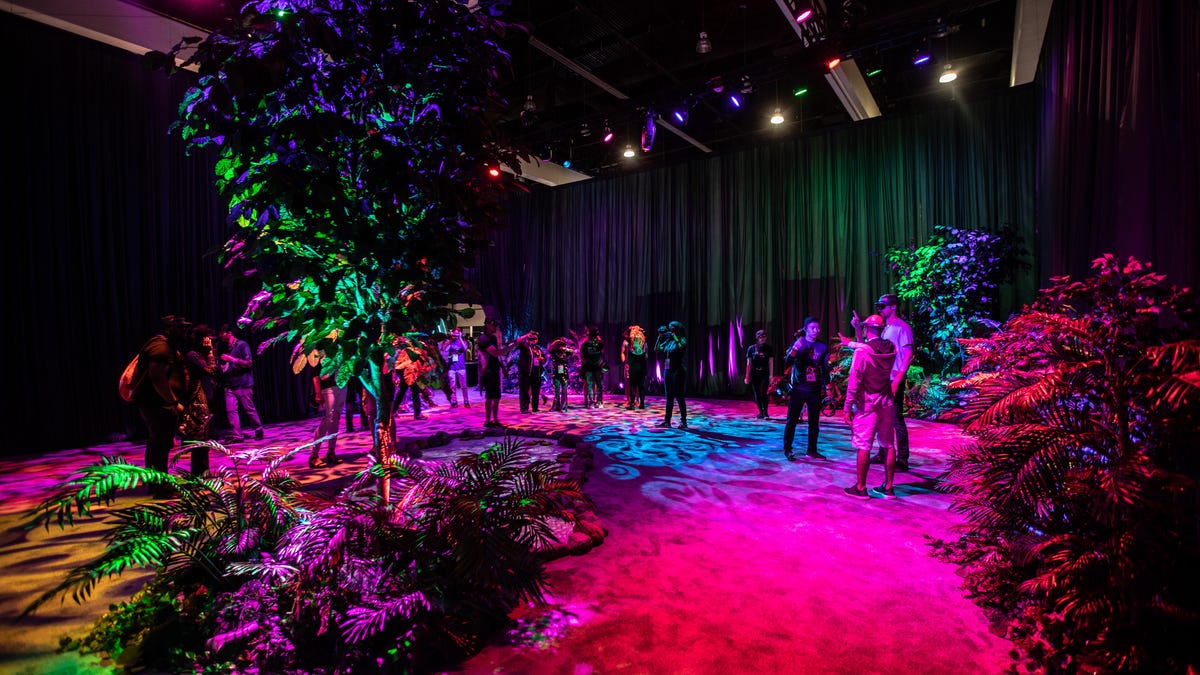What happened to VR at E3 2019? A quiet showing for virtual things
In the year of the VR's biggest hardware upgrade, the Oculus Quest, game companies were strangely silent in Los Angeles.

Unreal Garden, a virtual/augmented demo area at E3 2019.
If you were looking for cool new VR things at this year's E3 2019, you probably came to the wrong show. No wild new headset, no genre-shaking new games. That's OK. E3 wasn't expected to be big on VR this year. Just a few years ago, big gaming brands like Call of Duty and Star Wars: Battlefront were hawking VR levels. Today, nothing of the sort. I followed E3 from afar this year and was surprised how little VR FOMO I felt. Unlike the wild experiments happening at Sundance or the Tribeca Film Festival, or GDC, E3's VR moments were pretty subdued.
Does it mean that VR is starting to shrink away from the main spotlight in the gaming industry? I don't know. But there are a few clear explanations...maybe.
Microsoft: Dead silent on VR
The only big console maker with an E3 press conference this year didn't mention VR at all. While Microsoft wasn't expected to announce any VR hardware news, I still find it strange. Microsoft paved new roads with HoloLens, demoing AR games back at E3 2015. Microsoft has had VR headsets on PCs for years, too, and the original Oculus Rift and HTC Vive are both PC-based platforms.
Unlike the PlayStation 4 with PSVR, the Xbox One never had VR support. Who knows if that will change with Project Scarlett, Microsoft's next major console upgrade. The console's specs are more than capable of playing current VR games. Whether Microsoft feels that's important remains to be seen. For now, the bigger tech focus is game streaming.
Sony and PSVR weren't at E3 this year, but there's plenty of VR coming for PlayStation.
Sony: Still big on VR, but an E3 no-show
PlayStation VR has become a key part of Sony's PlayStation ecosystem, and Sony has been investing in major games for VR since 2016. This year is already seeing a number of high-quality games, from Blood and Truth to the upcoming VR update to No Man's Sky. PlayStation's global head of R&D, Dominic Mallinson, recently told me he sees a bright future for VR and envisions some key upgrades that could be coming to a future PS5-compatible VR headset. PSVR is already confirmed to work with Sony's next-gen console. But E3 wasn't the place to gather any more news, as Sony skipped the show entirely for the first time.
Nintendo: Labo VR may have been a one-off
The most unpredictable game company in the world shocked me with a cardboard Labo VR kit this spring, but while that kit has a few extras that work with games like Super Mario Odyssey and Breath of the Wild, it's not really a platform for future VR games. According to Labo head Tsubasa Sakaguchi, VR was always part of the plans for Labo in particular. But, while Nintendo had plenty of game news at E3, none of it involved more VR. I would have been shocked if they had.
PC: VR games here and there
A number of promising VR games were announced at E3, mostly during a livestream hosted by UploadVR. Many of the games were sequels. A few look to offer more advanced multiplayer. None of them, from the ones I saw demo videos of, looked incredibly surprising. (I didn't get to demo any...I wasn't at E3.)
PC VR gaming is a little fragmented right now: there's the new Oculus Rift S, which has its own in-headset tracking. There's Microsoft's Windows VR platform, which is becoming more enterprise-focused. Steam VR supports HTC Vive, and also the upcoming Valve Index, but so far, there haven't been any major new games that have emerged to make the most of the innovative Index controllers.
Games like Budget Cuts 2 and the wild music-shooting-rhythm game Pistol Whip look like some great ones to look forward to. Bethesda's VR Wolfenstein game looks interesting. But, on a whole, it didn't feel like any of these games were shooting to make VR any more must-have than it is now.
Oculus Quest: the console on the rise?
The most interesting wild card may be the Oculus Quest. The $399 totally mobile standalone VR headset is still the best thing I've seen in tech this year, and feels almost like the Nintendo Switch of VR. A handful of new game ports coming to Quest and announced at E3, seem like the most promising news of the show: Echo Arena and Arizona Sunshine, plus some music extras in Dance Central and Beat Saber. Many of these are still ports of existing games, or DLC, with a few unique projects in the mix. How many quality games Oculus can keep coming for Quest will determine how essential it feels. Right now, Oculus Quest is my favorite VR game system. But it's not where all the best games are yet.

